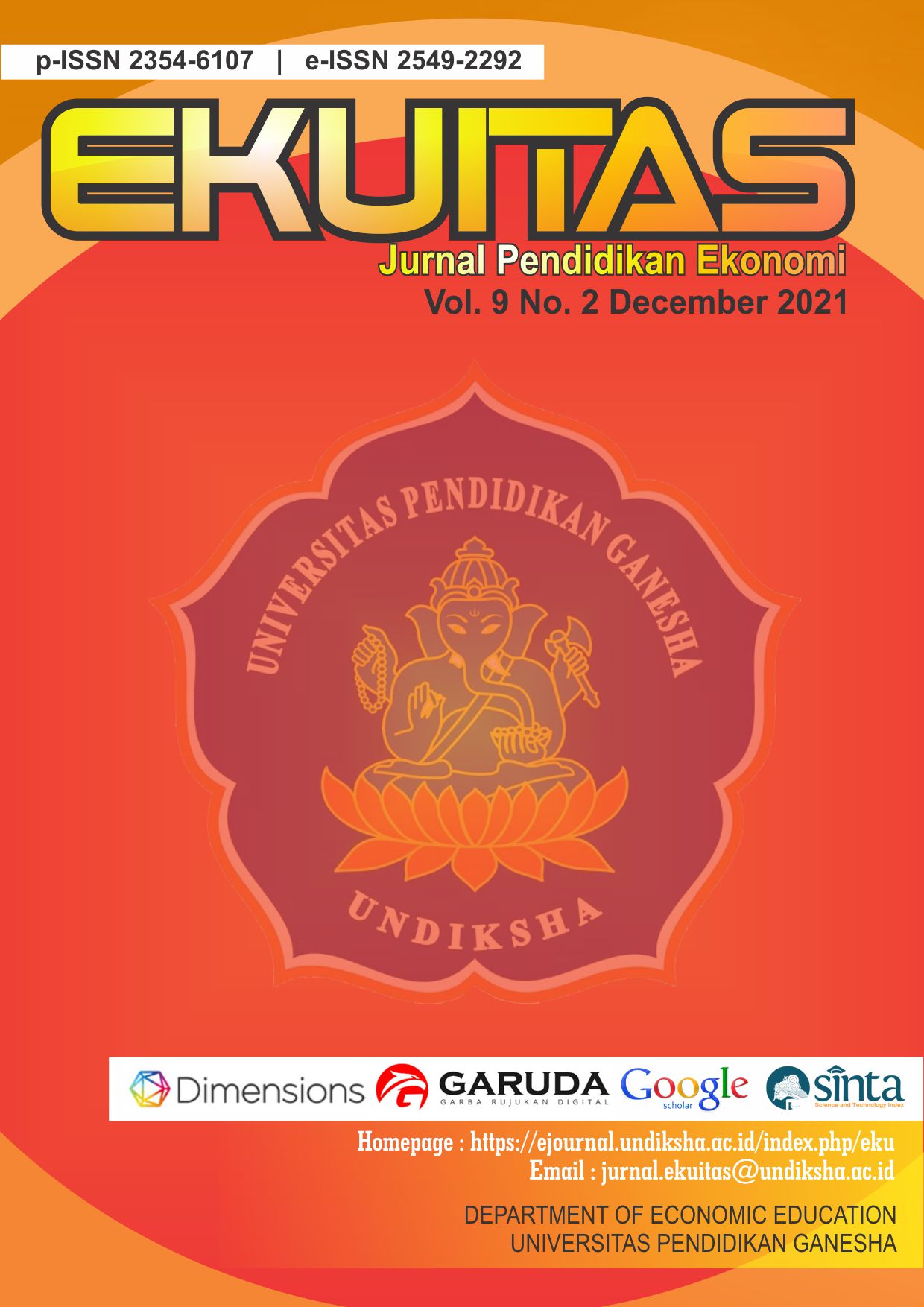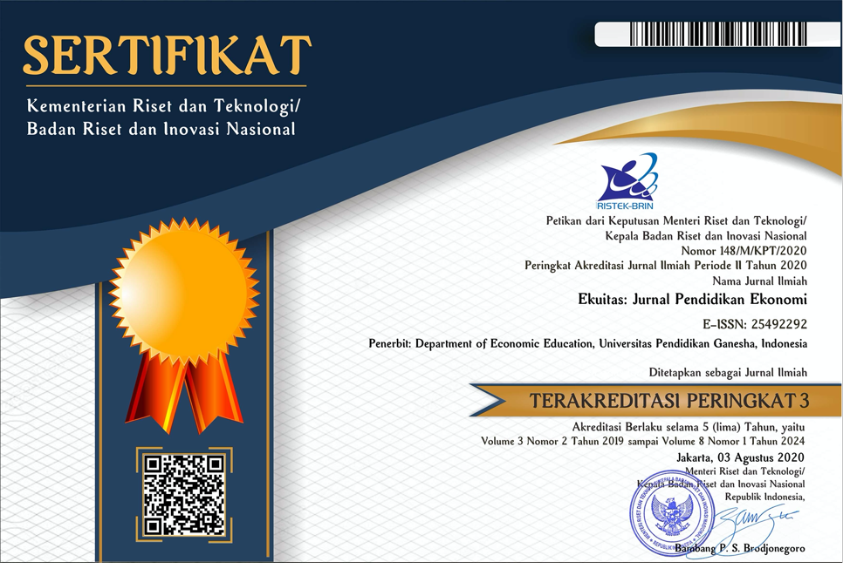Peningkatan Skill Berwirausaha UMKM Tunjung Segara Melalui Penerapan Model Paticipatory Rural Appraisal (PRA)
DOI:
https://doi.org/10.23887/ekuitas.v9i2.39587Keywords:
entrepreneurship, the paticipatory rural appraisal (PRA) model, skillsAbstract
The purpose of this study is to improve entrepreneurship skills in the development of Tunjung Segara MSMEs by applying the performance-based Paticipatory Rural Appraisal (PRA) model. The type of research is action research (action research). The research subjects were workers at Tunjung Segara SMEs, totaling 20 people. Quantitative data were collected in the form of a questionnaire and analyzed descriptively quantitatively. The results showed that the data processing of simple linear regression test constant values and regression coefficients showed that the entrepreneurial skill variable (X) had a positive effect on the development of MSMEs (Y) with the application of the Paticipatory Rural Appraisal (PRA) model if the entrepreneurial skill variable was increased by one unit, then business performance will increase by 66.43. Hypothesis Test Results (T test) The entrepreneurial skill variable (X) has a t-count value greater than the t-table value because the t-count value (5.387) > t table (0.444) and the significance level is .000 <0.05, then Ho is rejected and Ha accepted. The results of the t-test of the influence of worker skills on the development of SMEs, the coefficient of determination (R2) The coefficient of determination (R2) is used to see how much contribution the independent variable (X) is entrepreneurship skills to the dependent variable (Y), namely the development of SMEs. Based on the results of the analysis of the coefficient of determination, it was found that the magnitude of the influence of the entrepreneurial skill variable (X) on the MSME development variable (Y) was 73.9%. While the remaining 36.3% is influenced by other factors such as human resources, motivation, and mentoring. For MSMEs in Indonesia, the performance-based Paticipatory Rural Appraisal (PRA) model supports the improvement of entrepreneurship skills so that more MSMEs can develop their entrepreneurial skills.
References
Anggraeni, F. D. (2013). Pengembangan Usaha Mikro, Kecil dan Menengah (UMKM) Melalui Fasilitasi Pihak Eksternal dan Potensi Internal (Studi Kasus Pada Kelompok Usaha" Emping Jagung" di Kelurahan Pandanwangi Kecamatan Blimbing Kota Malang). Jurnal Administrasi Publik, 1(6), 1286-1295.
Christiana, Y., Pradhanawati, A., & Hidayat, W. (2014). Pengaruh Kompetensi Wirausaha, Pembinaan Usaha dan Inovasi Produk Terhadap Perkembangan Usaha (Studi Pada Usaha Kecil dan Menengah Batik di Sentra Pesindon Kota Pekalongan). Jurnal Ilmu Administrasi Bisnis, 3(4), 384-393.
Darya, I Gusti Putu. 2012. Pengaruh Ketidakpastian Lingkungan dan Karakteristik Kewirausahaan terhadap Kompetensi Usaha dan Kinerja Usaha Mikro Kecil di Kota Balikpapan. Jurnal Inovasi dan Kewirausahaan: Vol. 1. No.1. hal. 65-78.
Heliantina, Farah. (2017). Siaran Pers-Ekonomi Digital Mempercepat Pembangunan Ekonomi. Kementerian Koordinator Bidang Perekonomian Republik Indonesia. Tersedia di www.ekon.go.id
Hendrawan, A., Kuswantoro, F., & Sucahyawati, H. (2019). Dimensi Kreativitas dan Pengembangan Usaha Mikro Kecil dan Menengah (UMKM). Jurnal HUMMANSI (Humaniora, Manajemen, Akuntansi), 2(1).
Nafisah, L., & Siswanti, Y. (2018). Participatory Rural Appraisal (PRA) for Corporate Social Responsibility (CSR). no. I. Yogyakarta: Deepublish.
Putri, S. M. (2020). Pengaruh Keunggulan Bersaing dan Kompetensi KewirausahaanTerhadap Kinerja Usaha Mikro, Kecil, dan Menengah (UMKM)(Studi Empiris pada UMKM di Kabupaten Rokan Hilir). Journal of Public and Business Accounting, 1(2), 43-53.
Sarjono, H., & Julianita, W. (2011). SPSS vs LISREL: Sebuah Pengantar, Aplikasi untuk Riset. Jakarta: Salemba Empat.
Sri, M., & Ahmad, Y. (2017). Peluang dan Tantangan Pengembangan Usaha Mikro Kecil Menengah (UMKM) Dari Berbagai Aspek Ekonomi. Jurnal Ilmiah Manajemen Dan Bisnis, 2(1), 181-197.
Sutipyo. (2014). Kreativitas, pemacu dan penghambatnya dalam kehidupan manusia. Al-Misbah, 203-218.
Sya'roni, D., & Sudirham, J. (2012). Kreativitas dan inovasi Penentu Kompetensi Pelaku Usaha Kecil . Jurnal Manajemen Teknologi, 42-59.
Ummi, N., & Ismail, T. (2017). Strategi Pengembangan Klaster Bisnis UKM Banten Berbasis Kekhasan Lokal Dengan Pendekatan Diamond Cluster, Analisis SWOT dan Analytical Hierarchy Process. Conference
on Management and Behavioral Studie, (pp. 118-127).
Utami, E. N., & Mulyaningsih, H. D. (2016). Pengaruh kompetensi kewirausahaan terhadap kinerja UMKM. Bisnis Dan Iptek, 9(2), 98-109.
Yaumi, Muhammad dan Muljono Damopolli. 2014. Action Research: Teori, Model dan Aplikasi. Edisi Pertama. Kencana Prena Grafika Group. Jakarta.








